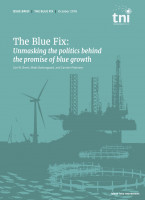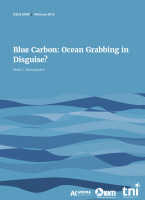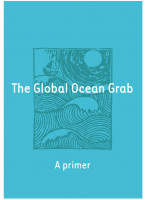The Illusion of ‘Blue Growth’
Topics
The Government of the Republic of Kenya, in collaboration with Japan and Canada, hosted the Sustainable Blue Economy Conference in Nairobi between 26 and 28 November. While the official site claims that this is the first global conference on the sustainable blue economy, it is only the latest in a string of Oceans-focused summits, such as the Our Oceans conference which was held in Bali, Indonesia in October, and the Sustainable Oceans Summits organized by the industry-coalition the World Ocean Council in Hong Kong earlier this month. There are still more events on the way, such as The Economist’s World Oceans Summit, to be held in Abu Dhabi in March 2019.
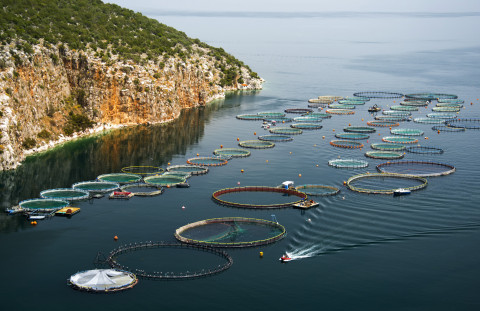
Flicker/Artur Rydzewski
These meetings typically bring together different actors including Heads of State, transnational environmental NGOs, corporations from a broad array of ocean industries, and so-called ‘impact investors’ around discussions of how best to ensure a purported ‘sustainable’ and ‘win-win-win’ use of coastal and marine resources.
Notably absent from most of these meetings, are representatives of the millions of small-scale fisher peoples that currently rely on coastal and marine ecosystems for their lives and livelihoods. When they are included, their presence is merely tokenistic, under the broad banner of ‘civil society’.
Similar to how small-scale fisher peoples are left out of these multi-stakeholder gatherings, so too are they being physically squeezed out of ocean-spaces. This is a result of an increasing interest by the above-named actors in changing the use and control of ocean-space through a ‘blue fix’ cocktail ostensibly aimed at protecting the oceans.
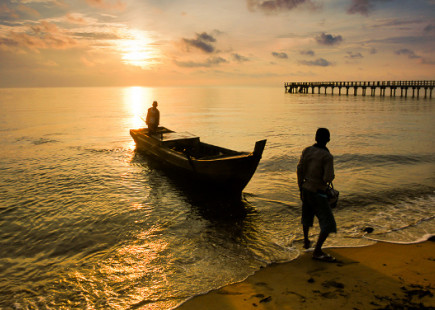
Haryadi Be / Flickr
Glaring Contradictions
The envisioned win-win-win covers ecological, social and economic fronts. In practice, however, the contradictions in this vision are glaring.
First, in tune with the more general turn towards conservation based on a model of ‘selling nature to save it’, the ‘blue fix’ discourse quenches the social thirst for action in the face of climate change by attracting private investment for protected marine areas and, so-called, sustainable tourism. It seems to be less about really challenging what is driving the destruction of marine and coastal ecosystems, namely the many different ocean industries, and more about turning conservation into a profitable venture, while accommodating destructive uses of ocean-space.
Second, it satisfies the growing global demand for healthy food and nutrition through the expansion of capital-intensive large-scale aquaculture, while brushing off the negative socio-ecological impacts. In the past 30 years, aquaculture production has exploded, outpacing the growth of capture fisheries at an average rate of 8.6% per year.
Aquaculture is now responsible for almost half of the fish we eat. It is true that this growing sector has provided a steady protein supply over the past three decades, but it relies on vast energy inputs and increasing volumes of capture fish, soy, rapeseed, sunflower and wheat for feed. Furthermore, it creates a series of social and ecological issues along the way.
For example, Turkish regulatory changes encouraged concentration within the sector by rejecting applications for marine aquaculture investments of less than 250 tons. This, coupled with the large amount of capital needed to enter a quickly intensifying sector, resulted in the direct or indirect elimination of small-scale fish farms by “growing companies and growing farms”. Aquaculture in Turkey shifted from production volumes of 1,500 fish per farm in 4 cubic metre wooden cages in the 1990s to one million fish per farm housed in circular cages of 50 metres in diameter. In short, the rapid growth in aquaculture has squeezed small-scale production out of the market.
And finally, despite much talk about the opportunities in offshore wind and other ‘renewable’ energy sources in the blue economy, in actual numbers oil and gas remains the key energy source – and hence focus remains on the upholding and expansion of the fossil fuel seascape. Simultaneously, the whole idea of oceans being the source of ‘renewables’ obfuscates the raw materials needed to sustain these ‘renewables’ – including rare-earth minerals, of which the seabed is increasingly seen as a supplier. For example, in Kiribati, the island nation whose Prime Minister is renowned for putting the consequences of sea level rise for Pacific Island States firmly on the international agenda, concessions for deep sea mining, mainly to source the key elements for wind turbines and photovoltaic batteries, is framed as part of the new clean energy-based blue economy. The environmental and ecological costs of such extraction are yet to be fully determined.
The illusion of Blue Growth
The ‘blue fix’ promoted by this slew of Ocean or ‘Blue’ conferences is merely an attempt at accommodating the interests of capital in expanding accumulation opportunities through existing and new ocean industries, while simultaneously maintaining some form of social legitimacy by promising that these new uses do not undermine sustainability, because they are combined with conservation.
Dressing up all these destructive practices in ‘blue’ language doesn’t change the nature of their material socio-ecological impacts for people and the planet. If we really want to move towards a more sustainable use of coastal and marine resource, we have to fundamentally challenge the expansion of many, if not all, of these ocean industries that are currently shacking up with Transnational ENGOs – while pushing out former users of these ocean-spaces, notably small-scale fisher peoples.
Tragically, small-scale fisher peoples are, in most cases, the only actors that can truly be said to be using these ocean-spaces in a sustainable manner. Perhaps all the people meeting in Nairobi should be taking their cue from the small-scale fisher peoples, who can provide the template for how to do so, instead of pushing for unsustainable blue-washed ‘solutions’ that exclude them and perpetuate the status quo.



